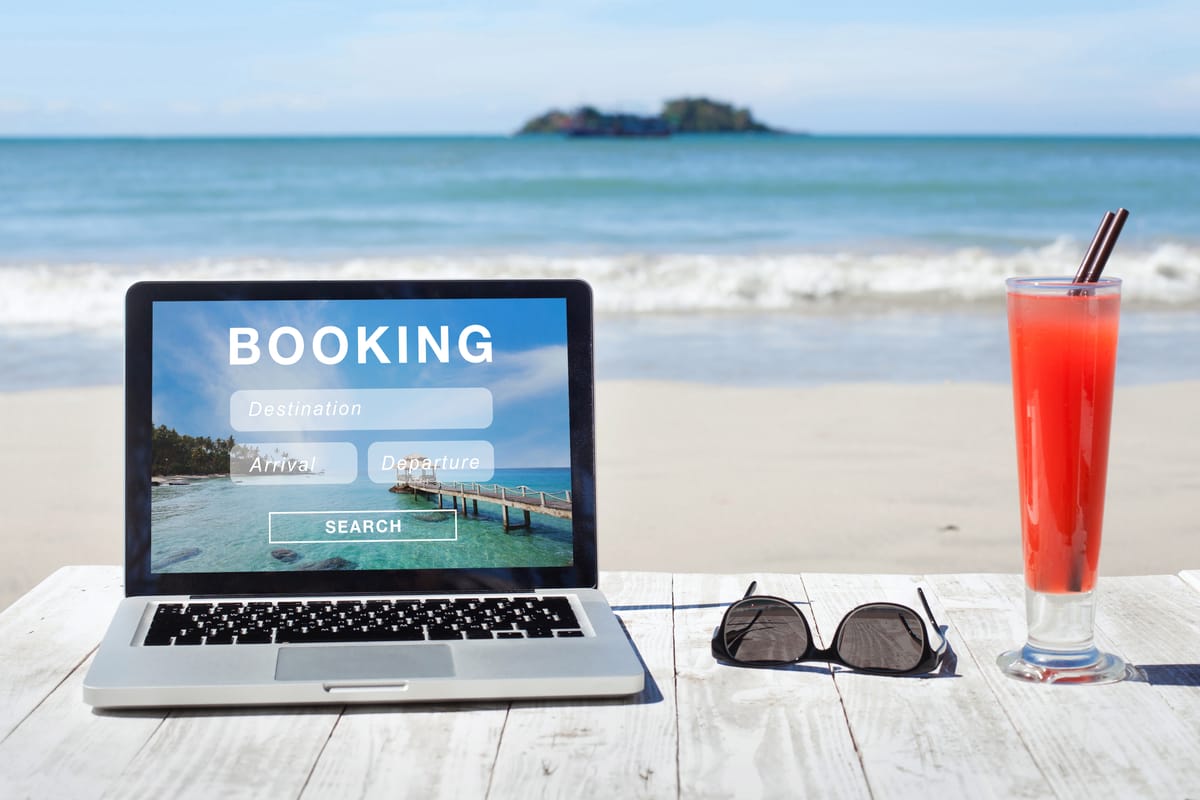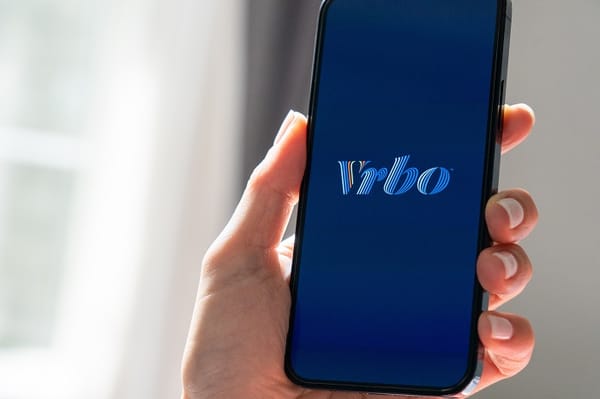Direct Booking Short-Term Rental Tactics: Claim 100% of Your Revenue

Airbnb hosts are realizing that a direct booking website should be an integral part of a vacation rental strategy. Here’s why.
Booking fees on Airbnb and other online travel agencies take away from your actual earnings and impact your bottom line. Direct booking websites are where the money is made and kept. But high OTA fees aren’t the only reason to pursue more direct bookings.
Discover why direct bookings matter and how to turn this channel into a reliable source of income. Building a beautiful, functional direct booking website is one piece of the puzzle. To truly make it work, you’ll need to transform it into a powerful revenue engine for your short-term rental business.
Let’s go back to basics and explore why having a direct booking short-term rental website for your short-term rental isn’t a luxury. It’s a channel that many hosts are actively choosing to build.
Why Do Direct Bookings Matter?
On OTAs, you’re not the true service provider — the platform is. That means you’re never fully in control of your listing. Platforms have their own algorithms, and ultimately, they decide what shows up in search results, how it appears, and how bookings are made, paid for, or canceled.
A report published by Skift analyzed this shift in the U.S. and revealed that direct bookings in short-term rentals are actually surging. Having your own website restores a level of control you could never have with the platforms.
Top Benefits of Direct Bookings
There are several clear benefits of direct booking in short-term rental property management. Here's what we refer to:
Saving money on OTA fees
The most common pricing model for booking platforms is a per-booking fee, which can range from 8% to 16%. The platform also charges guests a separate service fee. By cutting out the middleman, you keep all the revenue in your pocket, and the guests as well. This is where the "billboard effect" comes into play.
The "billboard effect" refers to when travelers discover a property on an OTA like Airbnb or Booking.com, then search for it online and end up booking directly through the host’s website. OTAs act like marketing billboards by increasing visibility. But if guests find a way to contact you directly and see a better price, they’re motivated to book directly. It’s a win-win for both guests and hosts.
Keep in mind that you're not allowed to promote your direct booking website through any OTA, otherwise, your profile will be flagged, which we'll discuss later.
Greater control
Property managers who accept direct reservations are less restricted by platform rules. As a host, you gain full control over how your short-term rental operates. You can set your own policies, such as cancellation policies or guest requirements.
On platforms like Airbnb, for example, declining too many reservations can result in penalties or reduced visibility. But with your own website, you can get in direct contact with potential guests, vet them yourself, and decide whether to accept a booking, and not worry about penalties.
Brand differentiation
The "billboard effect" we mentioned earlier works best when your property has a recognizable brand. And it’s much easier to develop that brand outside of OTA platforms. A direct booking website allows you to express your identity through custom design, storytelling, and professional photography.
You can feature local experiences, partnerships, or unique perks that aren’t allowed to be promoted on most booking platforms. With direct bookings, you move beyond being a generic listing, you operate as an independent business and a hospitality provider.
Better guest relationships
Finally, having your own direct booking site helps you stay in touch and build relationships with potential guests. You can collect their email addresses and phone numbers, which you can use to send personalized promotional offers.
Selling to existing customers costs much less than acquiring new ones. If your property is ideal for weekend getaways, you can rely on repeat travelers and referrals to spread the word within their networks.
How to Create a Direct Booking Website For My Vacation Rental Business
When it comes to building a direct booking website, you have two main options: create a custom website from scratch or use an out-of-the-box solution like iGMS. Both can help you accept direct reservations, manage calendars, and process payments—what matters is choosing the setup that fits your budget, business needs and tech comfort level.
When creating your website, note that it needs to have an integrated direct booking engine. That's actually a fill-in form guests use to make reservations by choosing a date and leaving their name, email, and phone number.
Custom website
Custom-made vacation rental websites are typically built by web agencies or freelancers. The main advantage is full personalization. You can fine-tune every detail of the design, layout, and features to match your brand and business needs.
However, custom websites are expensive, often costing $10,000 or more, and they take time to develop. This option is best suited for established property management companies or hosts with larger portfolios who want a fully branded experience and have the budget to invest.
If you’re just starting out or working with a limited budget, a custom site may not be the most practical choice.
Direct booking website with iGMS
When you use iGMS as your property management system, you can create direct booking websites at no extra cost.
You get an out-of-the-box, ready-to-use website that you can also personalize. The built-in templates not only save you money, but they also include a booking engine that’s automatically connected to the iGMS system and channel manager. This allows you to start accepting reservations from all channels simultaneously, without the risk of double bookings.
You can create your direct booking website in just a few simple steps.
Choose a Domain
You can either use your own domain if you already have one or let iGMS generate a free domain for you. Your domain name should reflect your property, location, and brand.
Create a Website
You can create one or multiple websites and start generating direct bookings. The process is simple and intuitive and it only takes a few clicks.
Once your direct booking website is live, iGMS will automatically sync your calendar with booking platforms like Booking.com, Vrbo, and Airbnb.
Customize Your Website
With the direct website toolkit, each site you create can be easily edited and personalized. You can add a custom name, logo, and header image to reflect your brand.
Connect with Stripe
To accept payments, you’ll need to set up a payment gateway. iGMS uses Stripe, so in the final step, simply connect your website to your Stripe account to start accepting guest payments securely.
Add Photos, Your Story, and Positive Reviews
Use original photos, write captions, and tell a short story about your property to make your listing more appealing. Don’t forget to include guest reviews as social proof, as they build trust and help convert visitors into guests.
How To Drive Customers to Your Website?
You’ve built your direct booking site. Now what? People need to find it, right?
Here are some ways to drive traffic to your website and convert visitors into customers.
Search engine optimization
Google and other search engines are a great source of traffic for websites. To make Google work for you, you need to understand the basics of search engine optimization so your website actually appears in search results.
One effective strategy is to focus on local SEO, which means using geo-specific keywords that travelers are likely to search for when looking for accommodations in your area. For example, if you own a mountain cabin in the Blue Ridge Mountains, potential guests might search for:
- “Blue Ridge mountain cabin rental”
- “cozy cabin in Blue Ridge for weekend getaway”
- “pet-friendly cabin near Asheville”
By including these kinds of phrases in your website’s text, meta descriptions, and blog posts, you increase the chance of being discovered by travelers searching for a stay just like yours.
Research the keywords travelers use when searching for accommodations, and check what already ranks on Google. Most likely, you'll see Airbnb and other major booking platforms at the top.
Competing with them can be tough, but if you find keywords where more local businesses appear in the results, that’s a good sign. It means those keywords are less competitive and worth targeting as an easier entry point.
For example, you can write local guides and blog posts to answer questions people might have. For a mountain cabin, you could write:
- “Top 5 Things to Do Near Asheville for a Relaxing Cabin Getaway”
- “Best Hiking Trails in the Blue Ridge Mountains Near Our Cabin”
- “What to Pack for a Weekend Stay in a Blue Ridge Mountain Cabin”
Branded search
If your property has a unique name or style that stands out among similar listings, it may trigger the so-called "billboard effect." As we said previously, it means travelers might try to find your website and book directly after first seeing your property on a major platform.
From the guest’s perspective, direct booking has both pros and cons. On one hand, they expect it to cost less. On the other hand, booking through a major platform offers a sense of security and trust. There you have your chance to show up as a trusted local business, as a brand.
Building a recognizable brand is more important than ever in the vacation rental industry, so it’s worth looking at your property from that angle too.
Social media promotion
Another effective way to drive traffic to your direct booking website is by promoting your properties on social media.
All you need to do is create a dedicated page on platforms like Instagram, Facebook, or TikTok and start posting. Video content performs especially well, so you can use the algorithm to your advantage and reach travelers who are actively searching for places to stay.
Your content doesn’t have to be limited to just showcasing your property and its surroundings. You can also showcase people enjoying their stay, share video testimonials, and highlight nearby attractions, events, or hidden gems to position your rental as the ideal place to stay in the area.
Email marketing
One of the best ways to attract repeat guests is through email marketing. Once you've collected email addresses, you can set up automated campaigns to stay in touch.
Send promotions, exclusive discounts, seasonal offers, insider tips, and local news to keep your property top of mind. Email is one of the most cost-effective channels for building relationships and turning one-time visitors into loyal guests. You can also segment your audience based on their past stays or preferences and personalize your messages, which increases the chance of them coming back again.
When you offer free Wi-Fi at your property, you can ask for contact details like an email address to access it. Many vacation rentals use this method and tools to capture the emails of all guests when they arrive in groups.
Referrals
Referrals can work beautifully when combined with email marketing. Hosts can incentivize past guests to refer friends, family, or colleagues by offering a discount. You can even give a discount to both the guest and the person they refer, making it a win-win.
It’s a powerful strategy that taps into people’s personal networks and leverages word-of-mouth as one of the most trusted forms of marketing. Since referred guests come through a personal recommendation, they’re more likely to book and become loyal customers themselves.
Micro influencers
Up until now, we’ve talked about how direct bookings save you money by cutting out third-party fees. But there’s one caveat. Sometimes, you need to invest in marketing if you want to successfully promote your direct booking website.
One effective and budget-friendly strategy is to collaborate with local micro influencers. These are individuals with a small but highly engaged following, typically between 1,000 and 50,000 followers, often focused on a specific niche like travel, local lifestyle, or outdoor adventures.
Because their audience trusts them, micro influencers drive authentic interest in your property. You can offer them a free stay in exchange for content and a mention of your direct booking site. This kind of collaboration often outperforms traditional ads, especially when targeting a local or regional audience.
Paid advertizing
Last but not least, let’s tackle the final tactic: paid advertising. Paid ads on platforms like Google, Instagram, can increase your visibility and drive traffic to your direct booking website. These ads promote your posts or videos to a targeted audience based on location, interests, and online behavior.
However, be careful when jumping into paid advertising. It can quickly turn out to be a beast that drains your budget if you don’t approach it with a clear plan.
To get the most value, first focus on building up your social media profiles. Make sure they look professional, with quality photos, clear branding, and engaging content. Once everything looks polished and appealing, and you have already gotten some engagement, you can start boosting your posts and videos. Begin with a small budget, test what performs best, and adjust as you go to get more eyeballs on your property.
FAQ
What if I have multiple properties?
A common question hosts have is: If I have multiple listings, do I need a separate direct booking website for each property?
The answer is no. Not necessarily. Many direct booking website builders, such as iGMS, allow you to showcase multiple properties on a single website (and also to build multiple free websites if you need to). You can create individual property pages, each with its own description, photos, availability calendar, and booking options.
A one-website approach keeps everything organized in one place, gives your brand a professional look, and simplifies property management.
Also, brand recognition is strengthened when you keep all your properties under one umbrella.
Can I send my Airbnb guests to my direct booking website?
No. This is something you need to be very careful about. Airbnb has strict rules against directing guests off the platform, especially to complete a booking.
If you try to share your website address or encourage guests to communicate or pay outside Airbnb, your profile will be flagged by the system. Repeated violations can result in penalties such as restricted visibility, temporary suspension, or even permanent removal of your account.
It's important to respect platform policies. Focus on building your brand outside of Airbnb so guests will find you organically in the future.
Can I do both direct bookings and OTAs?
Yes. Hosts can absolutely combine direct booking website reservations with major listing sites. New guests can discover your short-term rental through various channels, such as OTAs, Facebook groups, social media, and paid ads—and that’s completely legitimate.
However, if you plan to accept bookings from multiple sources, you’ll need a tool called a channel manager. This tool syncs your calendars across different platforms to avoid double bookings. iGMS, a dedicated property management system for hosts, includes a built-in channel manager to sync your calendars seamlessly.
Takeaway
A direct booking website gives you control over your brand, helps you keep all of your earnings, and builds stronger relationships with guests.
While OTAs like Airbnb are great for visibility, relying solely on them puts your business at the mercy of their rules and fees. Combine direct bookings with smart marketing tactics and listings on major platforms, and you create a reliable and flexible income stream.
If you start using iGMS, you can build a direct booking website that works seamlessly and stays in sync with all your calendars—all in just a few clicks and without spending a fortune on a custom site.
See how iGMS can help you. No credit card required.




![Complete Vacation Rental Email Marketing for Hosts [+ Top Tools]](/content/images/size/w600/2026/01/email-marketing.jpg)
